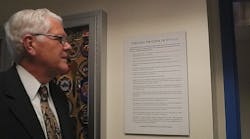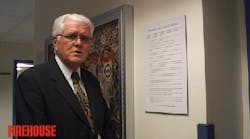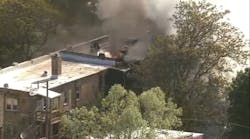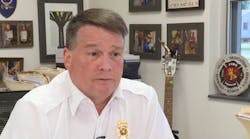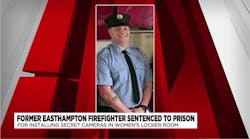The Baltimore Fire Department has implemented a strict new social media policy for what firefighters can post on Twitter, Facebook and personal blogs -- drawing criticism that the department is trampling on First Amendment rights.
Under the policy, department personnel can be reprimanded for anything they write online about their jobs that doesn't adhere to conduct rules, which require "good judgment" and "courtesy and respect to the public and to fellow employees." The policy also restricts them from sharing information about fire scenes.
Fire Chief James S. Clack said the department crafted the policy to protect firefighters from getting into trouble for sharing sensitive information.
But union leaders called the policy too broad and said the department created it unilaterally after negotiations with union attorneys broke down last month. Social media and free-speech advocates balked at the scope of the policy and questioned its legality.
Bradley Shear, a Bethesda attorney who has advised state legislators in Annapolis on social media policy, said the new provisions are "troubling" and potentially unconstitutional.
"I think the policy is clearly suspect," Shear said. "It's over-broad, it's retroactive, and I think they need to go back to the drawing board."
Clack initiated the drafting of the new policy this spring after fire personnel took to Twitter and other social media sites to grumble about department and city leaders and the decision to close fire companies to save money.
Clack said he observed some firefighters and officers "crossing the line" by posting sensitive and often incorrect information about fire calls, including some where first responders were still on the scene.
But firefighters said they believe their online criticisms of Mayor Stephanie Rawlings-Blake, Clack and other city officials following the company closures actually prompted the crackdown.
The new policy applies to online chatter even if the firefighters post anonymously, and regardless of whether they are off duty. While on duty, firefighters are specifically barred from commenting online about "matters of public concern."
Fire personnel are also prohibited from posting online "in such a way as to cause actual or reasonably foreseeable harm or disruption to the operations of the BCFD or the City." That would include sharing "the real-time public disclosure of locations of deployed units, assets or personnel or any other real-time information from an incident scene."
In addition, individual fire units can no longer maintain independent websites outlining their work in the communities they serve, and firefighters can no longer photograph or record images of department property without express permission.
David L. Hudson, a scholar at the First Amendment Center at Vanderbilt University who has written about public employees' social media rights, said the department's new policy generally "strikes a good balance between protecting free-speech rights and protecting the department." But, he said, the policy's "breadth" raises concerns.
Prohibiting online speech that doesn't show good judgment is too broad because it "could be interpreted to be anything they don't like," Hudson said.
Clack said the purpose is not to keep personnel in lock step with department leaders but to "avoid some of the problems that have cropped up across the country and even here in Maryland with firefighters posting things that get them in trouble."
This summer, several members of the Bel Air Volunteer Fire Company in Harford County were suspended or demoted after they complained on Facebook about not receiving a discount at a local restaurant and joked about not responding to emergency calls there.
"It's all kind of evolving in fire service and in police departments as well," Clack said of social media policy.
In Philadelphia, firefighters and union leaders publicly decried a new policy restricting firefighters' use of social media, including Facebook and Twitter. The department issued a four-page memo outlining the policy in August.
The Philadelphia and Baltimore policies are similar. Both restrict the use of fire department imagery and sharing information about emergency calls, and ban members from making discriminatory remarks online about race, religion and other personal characteristics.
The two departments also restrict the use of electronic devices on the job. The new Baltimore policy says firefighters cannot use personal mobile devices at fire scenes unless they have permission, and bans them from using cameras any time on the job.
The Baltimore Police Department had been in the process of creating a new social media policy as well, but that effort has been tabled as the new Commissioner Anthony W. Batts transitions into his role.
The new Fire Department policy applies not just to social media platforms like Facebook but also to chat rooms, online forums and all forms of "electronic communication" other than personal email services and private messaging functions. But the department will not routinely monitor social media accounts of firefighters, the policy states.
Hudson, the First Amendment scholar, said he appreciated that department officials "recognize employers shouldn't be the social media police and go around snooping at employees' social media."
State law bans employers from asking for employees' social media user names and passwords.
Michael Campbell, president of the fire officers union, said the new policy infringes on First Amendment rights and doesn't reflect many of the changes recommended by the unions before negotiations ended.
"The fire department said, 'We're going to do what we want to do. It's our way or the highway,'" Campbell said.
"The fire department is definitely overreaching," he added. "They're just throwing the kitchen sink out there and seeing what they can get away with."
Clack said department attorneys and the unions went "back and forth for months" on the policy, and the department did incorporate many suggestions from the unions. But eventually, both parties agreed they were not going to reach a consensus, and the department decided to move forward, he said.
"I think in the end, the unions felt like they couldn't support a policy 100 percent, because a lot of their members use social media," Clack said.
Clack acknowledged the policy's far-reaching scope but said he will take a more narrow approach to enforcing it. He noted: "It's certainly not my intent to fire anybody."
"Attorneys, when they get a hold of this stuff, try to throw everything in and cover every base, but I'm going to be most interested in people when they're working," he said.
Shear, the social media attorney, said one of the most troubling aspects of the policy is that it's retroactive.
Union contracts prevent the department from punishing employees for actions after a certain amount of time has passed, but Shear said the language of the policy could be understood to allow the department's good judgment standard to be applied to social media posts made years ago. "It essentially holds you accountable for things in the past, including things you might not be proud of in college or high school," Shear said.
"You've got to be careful regulating speech with public employees, and the way the policy is written, it appears to violate the principles of free speech," Shear said.
Copyright 2012 - The Baltimore Sun
McClatchy-Tribune News Service
